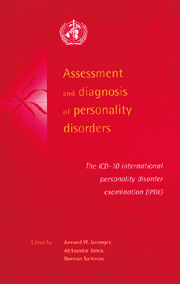 Assessment and Diagnosis of Personality Disorders
Assessment and Diagnosis of Personality Disorders Book contents
- Frontmatter
- Contents
- Contributors
- Preface
- Acknowledgements
- I Background and Field Trial
- Background
- Problems in the field of personality disorders
- Review of diagnostic instruments for the assessment of personality disorders
- Epidemiology of DSM-III personality disorders in the community and in clinical populations
- International personality disorder examination (IPDE)
- Experiences with the IPDE
- Field Trial
- II International personality disorder examination (IPDE) ICD-10 module
- Index
Review of diagnostic instruments for the assessment of personality disorders
from Background
Published online by Cambridge University Press: 04 August 2010
- Frontmatter
- Contents
- Contributors
- Preface
- Acknowledgements
- I Background and Field Trial
- Background
- Problems in the field of personality disorders
- Review of diagnostic instruments for the assessment of personality disorders
- Epidemiology of DSM-III personality disorders in the community and in clinical populations
- International personality disorder examination (IPDE)
- Experiences with the IPDE
- Field Trial
- II International personality disorder examination (IPDE) ICD-10 module
- Index
Summary
This chapter is intended to acquaint the reader with most of the instruments specifically designed to diagnose the personality disorders (PDs). The review makes no pretense at completeness. Preference is given to interviews and inventories that have also been used by investigators other than the developers themselves. The International Personality Disorder Examination (IPDE) is not included, since most of this volume (see Part II) is devoted to it. The account is mainly descriptive rather than analytical. For more of the latter, the interested reader will find Zimmerman's recent review especially informative.
There is an axiom in psychometrics that the more closely a test samples the criterion it attempts to predict, the more valid it is likely to be. Historically, the identification and delineation of PDs has emerged primarily from clinical observation. Therefore, it should not be surprising if diagnoses based on semistructured clinical interviews approximate clinical diagnoses more than those based on self-administered inventories. The obvious limitation of the latter is their inability to provide the observations, cross-examination, and judgement of the experienced clinician. Except for the dementias and mental retardation, there is nothing in the history of clinical psychological tests to warrant their being viewed as a close approximation to a psychiatric diagnosis.
Self-administered tests, however, may be valuable as economical screening devices. The literature suggests that personality disorder inventories are especially prone to false-positive diagnoses. Of course this is precisely what one expects from a screening instrument, where the main concern is to guard against an intolerable number of false-negatives.
- Type
- Chapter
- Information
- Assessment and Diagnosis of Personality DisordersThe ICD-10 International Personality Disorder Examination (IPDE), pp. 10 - 17Publisher: Cambridge University PressPrint publication year: 1997
- 17
- Cited by
